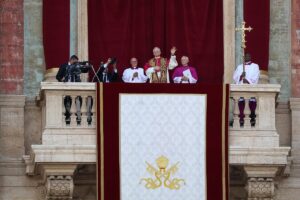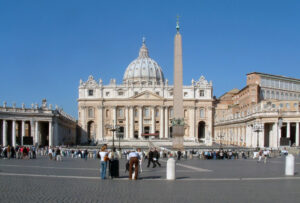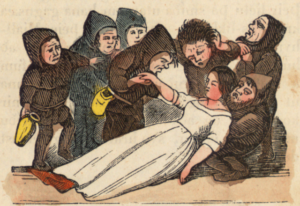
A New Pope, A New Dawn
Personal reflections on the papacy, an American pontiff, and hope that faith and leadership may yet shape our fractured world.
By Willemien Otten, Professor at the University of Chicago Divinity School. With an Introduction by Andreas Telser.

The Zero Theorem – “Zero must equal 100%”[1]. AI, Totalitarianism, and The Voluntary Path to Self-Enslavement: A Theological Perspective
The question of what philosophy and theology have to contribute to the development of AI has been a matter of scholarly debates. While AI entered common human lives almost abruptly and immediately, human adaptability proved impeccable: AI became a part of life as another commodity. In her contribution, Milja Radovic explores the possible downsides of AI from a theological point of view and asks the question: Is AI really for the benefit of humanity?

The Small Stone in the Shoe. When Obsession Meets Grace: The Ambiguities of Scrupulosity – A Review of „Can Scrupulosity Be Spiritually Innocent?“
In her article, Veronika Hübner reflects on a recent lecture by Tasia Scrutton at the European Academy of Religion, exploring the ambiguities of Scrupulosity—a religiously infused obsessive-compulsive condition that can deeply disrupt faith while occasionally fostering spiritual depth.

Das erste Jerusalem muss verteidigt werden
Ausgehend von Gedanken des Autors Dževad Karahasan zum „zweiten Jerusalem“ Sarajevo, spricht Christoph Novak über die Entmenschlichung als zentrale Problematik des Nahost-Konflikts und anderer Krisen und erinnert daran, dass der Kampf für Mitgefühl und Anerkennung des Anderen immer wieder aufs Neue geführt werden muss.

“Do you Hear the People Sing?”[1]. Cultural (Re)Interpretations and Reshaping Memory
In the world inter-wired through social media and AI, cultural reinterpretations and appropriations receive ever increasingly new meanings. Frequently cultural (re)interpretations and reshaping of historical memories form a dangerous mode for societal discourses. In this article Milja Radovic focusses on the Balkan Peninsula and considers it as one of the most important places in Europe where a dynamic processes through which communities reshape history, memory and culture takes place.

Between Apocalypse and New Life. The 78th Festival de Cannes: 13th – 24th May 2025
In this contribution, Milja Radovic reflects on the festival’s highlights, the role of the Ecumenical Jury and her own experience as a jury member. The articles explore some of the most interesting movies from the festival, offering thoughtful reviews and insights from the author’s perspective.

Wenn Bildung nur noch einen Marktwert behält. Die marktwirtschaftliche Ausrichtung von katholischen Hochschulen in den USA und die weitreichende Gefahr eines Ausverkaufs von katholischer Bildungstradition
Zum Problem werden Werte, wenn sie sich nicht mehr an den zugrundeliegenden Erfahrungen orientieren, sondern der kapitalistische Markt zum entscheidenden Faktor wird und darüber bestimmt, ob diese Werte von Relevanz sind und wie ihr Marktwert ausfällt. Diesem Problem geht Massimo Faggioli in seinem neuesten Buch – „Theology and Catholic Higher Education. Beyond Our Identity Crisis, Maryknoll 2024“ – nach, in dem er den gegenwärtigen Status der katholischen Bildungstradition in den USA untersucht. Eine Analyse von Florian Klug.

Der nächste Papst
Mit dem Tod von Papst Franziskus haben die Spekulationen über mögliche Nachfolger in den internationalen und nationalen Medien begonnen. Versucht man sich in Prognosen über potenzielle Nachfolgekandidaten des verstorbenen Papstes liegt die Aufgabe erstens darin, auf die Situation der Katholischen Kirche und die daraus sich ergebenden Diskurse über den Weg, den die Kardinäle beschreiten wollen, zu achten. Eine Analyse von Kurt Appel

Und jetzt? Der neue Papst vor dem Großinquisitor
„Die Wahl wird zwischen Betäubung und Prophezeiung liegen. Der göttliche Name, von dem uns die Zehn Worte gebieten, ihn nicht vergeblich zu benutzen, ist in den Mund der großen Verderbten zurückgekehrt….“ Ein kritischer Kommentar von Sergio Massironi. anlässlich der bevorstehenden Wahl des neuen Papstes.

The Troubles with Snow White. Cinematic Cultural Shifts and Re-imagining the Fairytale
The importance and meanings of fairytales have been studied across a range of scholarly disciplines. According to the traditional understanding, the universal aspect of fairytales is in examining and presenting the human condition and life-lessons about the battle between good and evil and the importance of virtues in life. The question is: should contemporary, re-imagined fairytales reflect the spirit of their time, ideologies or politics? An essay by Milja Radovic